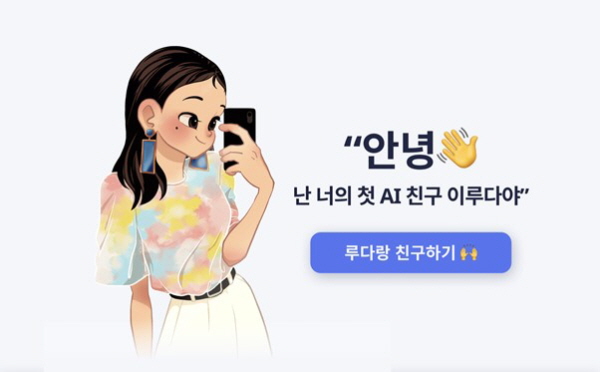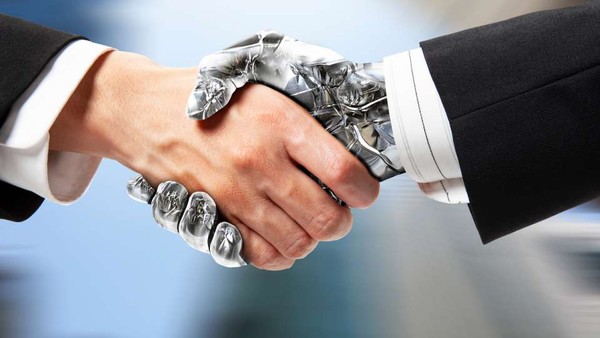
Noonsong, after waking and getting ready to leave her home, asks "How's the weather today? What should I wear?" A few seconds later, the answer is heard. "It's sunny now, and the temperature is 23 degrees." Noonsong who gets the information dresses accordingly. After leaving the house, Noonsong hops into a self-driving bus and gets off at an unmanned convenience store. She selects what she wants and pays a robot doing the work instead of a person. At the school library, she starts her tutoring lesson from an AI tutor. At the end of the lesson, Noonsong packs for home, but feeling the weather has gotten colder, she takes out her phone in order to pre-set the temperature at her home before her arrival. Again she hops on a self-driving bus and sets off for her home. Noonsong's day is over. Looking close at her daily routine, we notice something. Her day is filled with AI.

AI temperature measurement device
In the AI era
AI stands for Artificial Intelligence and refers to advanced computer programs modeled after human intelligence that think, learn, and make logical decisions. Simply put, AI is human intelligence through machines. AI has evolved over a long period of time, and what attributes to its birth is Alan Turing's 1950 paper on the feasibility of implementing a thinking machine. After publication of Alan Turing's paper, people began to delve deeply into the possibility of machines having human intelligence and they sought to make such an achievement possible in various fields. The word AI first appeared at the Dartmouth Conference in 1956. However, the AI was not commercialized until sometime later. There were several limitations to current AI, but work in being done to overcome the limitations in order to commercialize AI. A neural network study conducted in 1986 and Deep Blue, the supercomputer that took top prize at a world championship in 1997, are examples of the work being done to commercialize AI. Efforts over the years have allowed people to easily come into contact with AI all around them, and with continued effort to develop it, AI has become more and more commercialized. In 2005, Google researcher Raymond Kurzweil, emphasizing the rapid growth of AI, predicted that computer information processing capabilities will reach human capability levels in 2045.
AI has been utilized frequently to supplement activities in daily life for various reasons. According to an AI awareness survey conducted by Gartner, an American consulting firm, in 2018, the main reasons survey respondents claimed are in saving time and money. Furthermore, many respondents also cited high access to information through AI usage.1) These findings suggest people are attracted to AI use because of its efficiency and convenience. When COVID-19 broke out at the end of 2019 and caused many changes to daily life, perceptions of AI also changed. AI is used for video reading, unmanned field response, and movement tracking, all of which contributed to locations of COVID-19 hotbeds, on-site response, and prevention of further spread. AI played a valuable role in the COVID-19 response and people realized its importance. The most familiar examples we can see in daily lives are these. AI temperature measurement devices were introduced to help stop the spread of COVID-19 at entrances of buildings, and AI interviews became the norm during the non-face-to-face 2020 culture at private companies and public institutions. AI-related industries also grew as did the performance of AI devices, and domestic companies have now actively introduced various AI technologies. Moon Seunghyun, chair of the AI Cluster Forum, said "Because of COVID-19, AI around the world has been activated. The AI era has accelerated with the spread of COVID-19."2) Moon is predicting AI to be a major player in the Fourth Industrial Revolution. As such, AI has become recognized for its importance and provides citizens of the world much needed assistance.

Ubiquitous and useful
There are several methods for implementing AI, but machine learning is the most representative. Machine learning allows new knowledge to be learnt by providing data to computers. Machines can learn even without explicit programs that teach them to learn. Computers with machine learning learn from the acquisition of rules in the process of collecting data and results, and such machine learning is done through supervised learning, unsupervised learning, and reinforcement learning. Another way to implement AI similar to machine learning is through deep learning. The biggest difference, however, is autonomy. For machine learning, the data required for learning is provided manually, but for deep learning it is acquired by the computer itself by classifying data in order to respond to complex situations at levels similar to that of humans. As developments and innovations are being made constantly in the AI industry, more advanced AI is now commonplace in daily life, and AI and humans entered into an inseparable relationship.
AI is being used in almost all industries. Recently, the video app TikTok, popular around the world, is renowned for its use of AI in the Inverted Face Challenge, which recognizes a user's body and has a screen effect. Gigagenie, which provides weather information for Noonsong, uses an AI speaker and voice recognition technology based on deep learning algorithms. Self-driving cars are intensive forms of AI technology. Passengers of Waymo, a self-driving car, no longer need to pay attention to the road when driving, so they are free to simply enjoy the drive. Recommended algorithms and chatbot services have become useful to many people and employ AI. In other words, AI is being used in many ways. The scope of AI use is expanding and it was shown on the program <The Match of the Century, AI vs Human>, which aired on SBS in February as a Lunar New Year special. The program presented various competitions between AI and specialty experts in the field. The six categories of competition were composition, golf, stock investment, imitation, psychological awareness, and montage production. TV viewers were surprised at the ability of AI in those specialty fields as well as how well AI could perform against humans in the fields. AI is expanding and it is not possible now to imagine a future without AI.
AI is showing its presence and power in various global issues. It also positively affects modern issues such as global health. Healthcare is expected to be the areas where AI will have the most impact, in particular, AI is expected to help identify the existence of and examine stages of cancer. Utilizing AI algorithms based on deep learning, hospitals will be able to predict diseases such as liver, rectum, and prostate cancer with 94% accuracy. AI will also help in disease related decisions by managing numerous clinical trial results and data on drug development. Another way AI will have a positive effect is as a tool for people with disabilities. Huawei, a Chinese telecommunications equipment company, created an app named StorySign that helps deaf children translate and read texts in sign language using AI and augmented reality. Another app named TrackAI allows doctors to predict and start treatment in advance before blindness occurs. Global hunger is also a huge global issue, and AI is working fast to help end it. Data held by AI is searching for fertile soil that is physically difficult for humans to explore and trying to plant crops that can be used to resolve food shortages. In addition, AI is being used to help prepare for natural disasters and protect wild animals, and various uses of AI and its resulting positive effects have contributed to expanding its area rapidly.

The other side of AI
While AI is making life easier, there has been some negative response to its usage growth. The recent AI chatbot Leeluda sparked controversy and the need for AI control and regulation. The app, which was launched late last year and attracted 800,000 users in just three weeks. A 20-year-old female college student is the main character who has a friendly voice and manners. It was aimed at improving user intimacy and resolving emotional loneliness, but its purpose got lost and distorted. Users started experiencing minority discrimination and their personal information was leaked. There were also cases of sexual harassment by some users towards Leeluda, which only deepened the gender conflict. With these concerns on the rise, Leeluda was discontinued within a month of being launched. Professor Kim Jaein of Kyung Hee University's Center for Cross Culture Studies said, "Leeluda was an opportunity to reflect on AI technology which came into our lives deeply as well as ethical and social technology concerns that need addressing as they could be both beneficial and harmful."3) This statement by Professor Kim shows how AI like Leeluda can affect society and people. People first learned about the side effects of AI technology through this incident and realized the need to establish a sense of ethics in AI.
Another limitation of AI is its uselessness against the numerous unforeseeable circumstances. The world is constantly changing, and diverse peoples make up its demographics. In order for AI to perform its role smoothly, it must consider all aspects of various inputs. However, current AI can only perform tasks set by algorithms, and AI cannot with certainty determine or provide insight into casual relationships. In addition, AI does not view problems simultaneously but performs only stochastic decision making through algorithms. The problem of bias due to error in learning solely from data is another limitation. Most current AI services are based on machine learning, and for machine learning AI to improve performance it needs a huge amount of input data. However, if the data is flawed or there are distortions present in the learned data itself, AI services learn that and it affects the AI decision or performance. For example, if the learned data is inherently biased against a particular race or group of people, the AI service will also be biased, and naturally humans will no longer have trust in it. At a time when AI is expanding its influence on human life, efforts are urgently needed to recognize its limitations and to establish reasonable and viable regulations.
The number of growing incidents is revealing the limits of AI, and people have started demanding improvement, so various organizations have announced measures to offset AI limitations. Several businesses including Naver and Kakao have announced AI ethics regulations and promised to tighten regulations on personal information security. They have also actively started engaging in discussions aimed at strengthening the obligation and transparency of decision making and providing transparent explanations of algorithms used in its services. The Ministry of Science and ICT also announced national AI ethical standards in 2019. And from this year, the government announced that it will create new jobs by expanding AI, collecting bio data, and supporting ICT related startups. The government also plans to allot a large amount of the year's budget to expanding the data available for AI learning, which is essential for AI service development. It will further promote digital transformation of various companies and institutions. The private and public sectors are quickly preparing for AI as it has already been embedded into daily life. This will allow people to better AI services.

Live with AI
The AI era has arrived. It positively affects everyday life and is now clearly established as an indispensable part of life. In order for AI to continue to be positive, there is a need to overcome existing limitations and develop properly with human help. People need to actively review and practice ways of overcoming AI shortcomings to properly enjoy AI services. Once AI is properly and ethically established, all of humanity will benefit and enjoy better lives.
1) Jeong Dongjin, "Gartner Says AI Saves Time and Money", Toyo Economy, December 17, 2018
2) Kim Eunyung, "After COVID-19, the AI Era Accelerates.", The Science Times, April 29, 2020
3) Choi Yujin, "AI, Can It Be Human's Friends?", The Kyunghyang Shinmun, March 2, 2021


